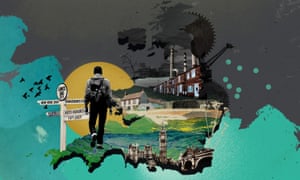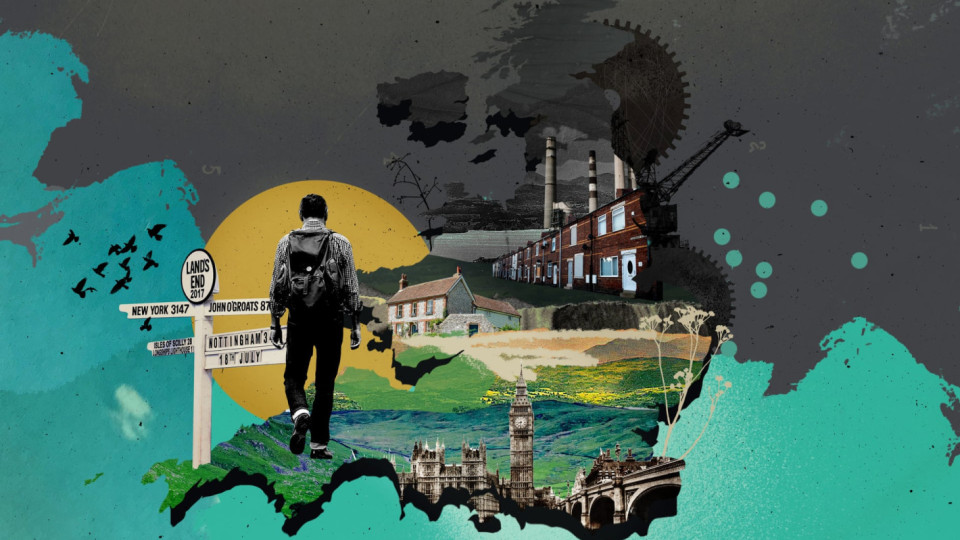
Industrial decline began in the 19th century, when scorn for manufacturing set in. But delusions of greatness continues

The Australian writer and academic Donald Horne is best remembered in Britain for his vivid summation of one of its largest divisions – that between the north and the south. Writing in 1969, Horne decided that the Britain of what he called the northern metaphor was “pragmatic, empirical, calculating, Puritan, bourgeois, enterprising, adventurous, scientific, serious and believes in struggle”; while in the southern metaphor the same country was “romantic, illogical, muddled, divinely lucky, Anglican, aristocratic, traditional, frivolous, and believes in order and tradition”. The north’s great sin was “a ruthless avarice” rationalised in the belief that humanity’s prime impulse was “a calculating economic self-interest”; the south matched it with “a ruthless pride” that believed “men are born to serve”.
Horne included Scotland with northern England as “the north”; and, if he’d thought about it, he might well have included Wales too, because what he considered to be northern qualities had matured in the places most affected by the industrial revolution. But it was not as though Horne believed these attitudes were strictly defined by geography, as though the traveller left the village ponds of Sussex in fuzzy Technicolor and arrived at Manchester’s mills in stark black and white.
The two ideas quarrelled with each other in every bit of the country. Both of them concluded that “Britain is best” – but, to quote Horne, “in the contest as to what Britain was best at [his italics] it was, on the whole, the southern metaphor that won”. Fifty years later, the qualifying “on the whole” is no longer necessary: the southern idea of what the country represents has won hands down, though that country is now England rather than Britain and avarice has moved south from its original headquarters – or so the cliche about muck and brass suggests – in the villas of the northern industrialists.
Like many people, I first came across Horne’s metaphors in a book by the American historian Martin J Wiener titled English Culture and the Decline of the Industrial Spirit, 1850-1980. Prof Wiener’s book appeared at a propitious time, just as Margaret Thatcher’s policies began to make serious inroads into manufacturing industry, and it became celebrated for its cultural explanation of Britain’s industrial failure: basically, that the country’s moneymakers and technical pioneers wanted to be landed aristocrats more than they wanted to continue as industrialists, and had little sustained appetite for manufacturing.
England was among the most densely populated, urbanised and polluted countries in the world. The factory owner’s ambition was to become a hunting-pink member of an older, more rural regime, a pose that reflected a popular ambivalence towards the grimy and unhealthy processes that had made the country rich. Britain’s downward slide – relative to competitor nations such as the United States and Germany – had begun long before the 19th century was over.
Horne’s metaphors suited this argument, but that was all I knew of them until a few weeks ago when a generous reader of this column sent me a copy of Horne’s book God is an Englishman, where they originally appeared. God is an Englishman is long out of print – any copies to be found online date from 1970 and have been buried (metaphorically) by references to a novel of the same title by RF Delderfield that appeared soon after. Perhaps Delderfield’s novel confused the market; perhaps Penguin didn’t put enough effort into selling copies of a book that it imported from Australia: for whatever reason, a clever and prescient analysis of Britain never got the public attention it deserved.
The Britain Horne describes is the country I came of age in: the world’s third nuclear power, the greatest owner of overseas assets after the US, the financier of a third of world trade and (how incredible this now seems) the world’s second biggest exporter. Compared with nations of roughly equal population, it was twice as prosperous as Italy and eight times as prosperous as Nigeria, and outdid or rivalled another island nation, Japan, in most indicators of wellbeing. But were the people happy? To be third in the league table of synthetic rubber production, Horne wrote, didn’t “cheer up” a nation that had got used to the idea, often fallacious, of being first in anything it turned its hand to. In his judgment, “The British have not been taught to be thankful for their great mercies … They have not yet learned to talk in a new way about their past, their present, and their future.”
Out of this inarticulacy had come the muddle that Horne thought was symptomatic of the southern metaphor. There was pride in both bigness and smallness: “The British could not – and still cannot – imagine what size they are.” As for “the long 20th century twilight of the northern metaphor”, Horne chose to illustrate it with a brilliant examination of the word “provincial”, with all its implications of the dowdy and the second rate.
In contrast to other countries, the definition wasn’t dictated by geography. “The English do not see rural villages as provincial, or ancient cathedral towns that happen to be in the provinces. Things that are rural or ancient are at the very heart of southern English snobberies, even if they occur in the north.” He then offered a definition that’s persuasively exact: “Provincialism is to live in or near an industrial town to which the industrial revolution gave its significant modern form.”
Most people in England, in fact in the whole United KingdomK, lived like that when Horne published his book; the biggest change in the intervening years is that most of the towns have ceased to be industrial. Meanwhile what he described as the “indestructible vanity” of London has increased, as the management of money became more important to the British economy than any other enterprise. In this way, to read Horne’s book now is to see a country being planted with the seeds of division and delusion, the crop ready for harvest in 2016.
Today, many people and several newspapers still believe that British institutions are “a paradigm of what political and judicial things should be”, while retaining “a feeling that [similar] institutions ‘abroad’ are in reality gimcrack”. I read that sentence this week on the same day the European parliament debated the British government’s new proposal. In 2014, it is worth remembering, Ukip had 24 of the 73 MEPs elected by the UK. Thanks to splits, defections and fisticuffs, only seven of them retain the party label, but the rest remain as independents, the whole rackety ensemble drawing their £7,000 a month salaries and generous expenses, and shouting boorishly at speeches made by other members. Mairead McGuinness, the Irish MEP chairing Wednesday’s session, had to chide them: “This is not the House of Commons, colleagues, this is the European parliament.” Who other than a dimwit xenophobe could see and hear this and not feel shame?
Towards the end of his book, Horne warns that if the old ways of British thought and behaviour persist they may begin to seem absurd, and if that happens “everything may become folly … In such a state things will change, but perhaps disastrously.”
The Guardian













Leave a comment